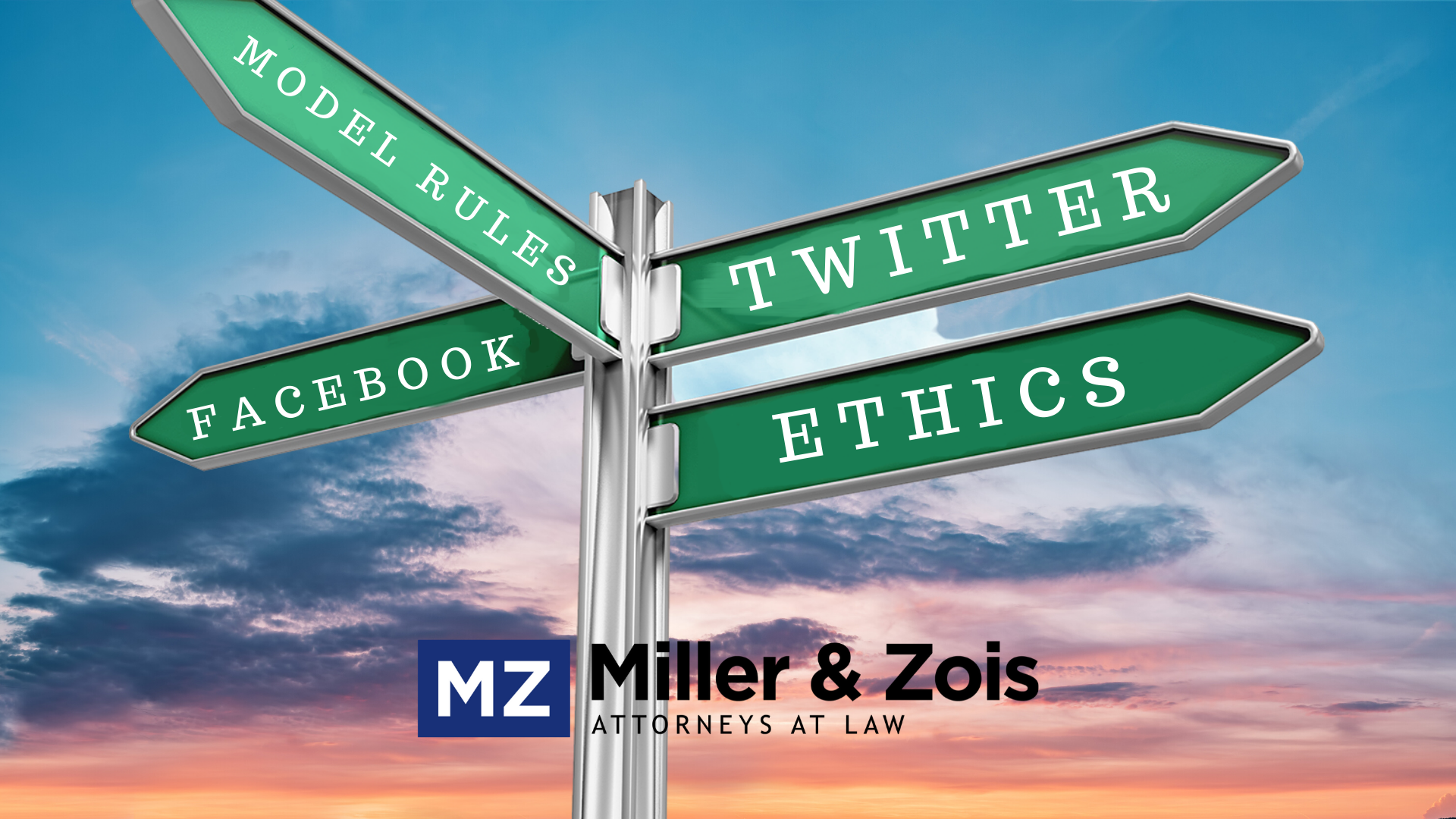 Social media is great. It’s an excellent way to maintain contact with old friends. It’s an excellent place to get news before any TV station gets it. You can even follow Miller & Zois on Facebook. We are pretty cute, right?
Social media is great. It’s an excellent way to maintain contact with old friends. It’s an excellent place to get news before any TV station gets it. You can even follow Miller & Zois on Facebook. We are pretty cute, right?
But it is a scary new world. How many times have you heard about someone gets fired or disciplined because of an ill-advised post or comment? How many politicians have resigned because they thought it was a good idea to send a “private” message to an intern? How many people have been arrested from a tip found on social media?
Facebook and other forms of social media can also spell trouble for lawyers, too. In New Jersey, two attorneys were recently sanctioned for sending a Facebook friend request to another party.
Facebook Stalking As Discovery
If you want to get a good appreciation for the procedural posture, here is the case. The whole thing started with a personal injury case. An 18 year was doing push-ups in a fire department driveway. A police car pulled in and struck the man. As a result, he suffered a fractured femur and had to undergo a few different surgeries. He sued the police department, who is represented by attorneys Robertelli and Adamo.
The attorneys ask their paralegal to take a look at Plaintiff’s Facebook page, which was open to the public. She saved information such as pictures, videos, and his comments on other people’s pages. The Plaintiff got wise and made his profile private. So Robertelli and Adamo ask the paralegal to send Plaintiff a friend request because, hey, random girl. All the while, Robertelli, and Adamo are racking up information on the Plaintiff, including videos of him wrestling and partying, which they intend to use to impeach his claims of permanent injuries. So the parties show up to a deposition where Robertelli and Adamo ask how Plaintiff has wrestled, party, and dance with such severe injuries.
Really, it is a defense lawyer’s dream scenario. Still, the case settled for $400,000.
So How Is This An Ethics Violation?
The Model Rules of Professional Conduct (which are adopted by most states, including New Jersey), prevent attorneys and their staff from contacting represented clients personally without consent from their counsel. Here, the Facebook stalkee alleged that improper party contact occurred when Robertelli and Adamo’s paralegal sent him a friend request without seeking permission from the plaintiff’s attorney. He first filed a grievance which was dismissed with little consideration.
His attorney remained bitter, I guess, and supplemented that grievance with additional information pertaining to Robertelli and Adamo’s actions. After an investigation, the New Jersey ethics office filed a formal complaint against the two attorneys for 1) communicating with a represented party, 2) failing to supervise a subordinate lawyer, 3) failing to supervise a non-lawyer assistant, 4) inducing another to violate the rules of professional conduct, 5) conduct involving dishonesty, fraud, deceit and misrepresentation, and 6) conduct prejudicial to the administration of justice. Mind you, all of this stemmed from the simple act of Robertelli and Adamo’s paralegal sending the plaintiff a Facebook request.
Really, this whole thing boils down to whether a Facebook friend request constitutes “communication” under the Rules of Professional Conduct. Maryland has the same rule as New Jersey, which states that:
a lawyer shall not communicate about the subject of the representation with a person who the lawyer knows is represented in the matter by another lawyer unless the lawyer has the consent of the other lawyer or is authorized by law or court order to do so.
 Maryland courts touched on this issue (in a way most analogous to the facts here) in one case involving an attorney sending text messages to an opposing party. It was a divorce case where she was also sleeping with her client and paying his child support to the opposing party. Okay, that one is clear. This Facebook request is an ethical violation that is more problematic.
Maryland courts touched on this issue (in a way most analogous to the facts here) in one case involving an attorney sending text messages to an opposing party. It was a divorce case where she was also sleeping with her client and paying his child support to the opposing party. Okay, that one is clear. This Facebook request is an ethical violation that is more problematic.
Robertelli and Adamo claimed that they misunderstood the implications of a friend request, thinking anyone could hit the “Add Friend” button and see their profile. So it is unclear whether their defense is that they misunderstood the implications of a request or if a request is not a communication for the ethics rule. Maybe they don’t know either. But just because their defense is a little goofy, does not mean they are wrong.
I think there’s definitely an argument to be made whether it is a “communication.” In one sense, by “friending” someone, you are taking an affirmative step to gain access to their information.
Gaining access to someone’s Facebook profile is more about gaining access to their information than it is trying to communicate with them. This is especially true considering that you do not have to be Facebook friends to “message” someone. If the former is true, it may be permissible to look at a party’s public Facebook profile, but impermissible to friend them and then look at their private profile. Personally, I come down on the “this is not a communication” side of things. Even it is a communication, I don’t see the wisdom in sanctioning these guys. The ground is just too shaky.
Ultimately, there are no specific attorney rules for Facebook. Lawyers have to use good judgment and there will always be a gray area where reasonable minds will differ.
Jurisdictional Issue
As I said before, this case is currently in a jurisdictional stalemate. Robertelli and Adamo actually sued the ethics board, seeking a declaratory judgment that the ethics board could not pursue additional sanctions after dismissing the Plaintiff’s initial grievance.
I suppose it is some double jeopardy type argument. The trial court dismissed the suit, claiming that the New Jersey Constitution mandates that all attorney grievance matters be heard by the state’s highest court. An appellate court affirmed, and the case is now headed to the New Jersey Supreme Court.
Can a Lawyer Be Facebook Friends with a Judge?
A Florida Supreme Court case in 2018 looked at whether there is a conflict if the judge is Facebook friends with one of the lawyers in a case. In this case, a law firm filed an action against USAA for fraud perpetrated by USAA’s executives in its business dealings and negotiations with HLG. Why? I don’t know. It is World War III with the plaintiffs’ lawyers and insurance companies in Florida in a way we cannot comprehend in Maryland.
Anyway, USAA hired a lawyer who was once a judge. So the trial judge was Facebook friends with USAA lawyer. The plaintiffs filed a Motion to Disqualify the Trial Judge, relying in part on a Florida Code of Judicial Conduct Canon that said that judges should not be Facebook friends with attorneys or litigants who appear before them.
So what is the factual significance of selecting someone as a friend on Facebook? It depends, right? The majority held that it does not necessarily mean much:
It is therefore undeniable that the mere existence of a Facebook “friendship,” in and of itself, does not inherently reveal the degree or intensity of the relationship between the Facebook “friends.” Since the creation of a Facebook “friendship” in itself does not signal the existence of a traditional “friendship,” it certainly cannot signal the existence of a close or intimate relationship….In short, the mere fact that a Facebook “friendship” exists provides no significant information about the nature of any relationship between Facebook “friends.” Therefore, the mere existence of a Facebook “friendship” between a judge and an attorney appearing before the judge, without more, does not reasonably convey to others the impression of an inherently close or intimate relationship. No reasonably prudent person would fear that she could not receive a fair and impartial trial based solely on the fact that a judge and an attorney appearing before the judge are Facebook “friends” with a relationship of an indeterminate nature.
Three judges dissented from this opinion. So this is still a hotly contested issue.
Take-Home Message
I do not think what they did in the New Jersey case is a big deal. Further, I believe the New Jersey Supreme Court will agree with me. However, the rules are unclear. This is all fresh ground, so it is probably a good idea to avoid “friending” represented parties and probably not a great idea for judges to adjudicate disputes involving their Facebook friends.
- Who can you friend? (one bar association has an opinion)
- Social media and trial preparation
- The Maryland Court of Special Appeals addresses the social media for (what I think) was the first time
- Baltimore Injury Lawyer Blog post on an example where social media posts blew up in the client’s face
- Have I complained about defense lawyers’ insane quests to dig up Facebook dirt? I have been remiss.
 Maryland Injury Law Center
Maryland Injury Law Center


